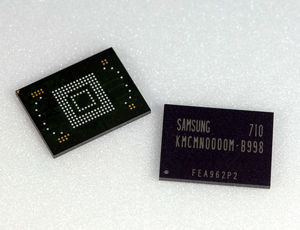|
The iPhone Wiki is no longer updated. Visit this article on The Apple Wiki for current information. |
Difference between revisions of "NAND"
(added a presentation link) |
m |
||
| Line 1: | Line 1: | ||
[[Image:8GBflash.jpg|thumb|left|Example of a NAND chip.]] |
[[Image:8GBflash.jpg|thumb|left|Example of a NAND chip.]] |
||
| − | This refers to the NAND flash chip used in the [[Apple TV]], [[iPad]], [[iPhone]], [[iPod touch]] |
+ | This refers to the NAND flash chip used in the [[Apple TV]], [[iPad]], [[iPhone]], and [[iPod touch]]. This is where all the storage capacity comes from. The capacity in each chip can range from as little as 4 GB to as many as 128 GB. In iOS, it is split into two partitions: the system partition and the user partition. The system partition contains the [[iOS]] operating system and the native Apple applications, and is mounted as read-only. The user partition contains all user data, including installed applications, music, and movies, and is mounted as read/write. Jailbreaking modifies the file [[/etc/fstab]] to enable read and write access on both partitions. |
| − | < |
+ | <div style="clear:both"></div> |
== Extras == |
== Extras == |
||
| − | NAND partition layout in modern devices, courtesy [[CPICH]], published in [ |
+ | NAND partition layout in modern devices, courtesy [[CPICH]], published in [https://twitter.com/cpich3g/status/15966288660660224 Twitter] ([http://freepdfhosting.com/29256fdff9.pdf NAND partition layout])... |
=== PDF thumbs === |
=== PDF thumbs === |
||
| + | <gallery> |
||
| − | [[Image:N1.png|thumb|500px|left|Page 1]] |
||
| − | + | Image:N1.png|Page 1 |
|
| − | + | Image:N2.png|Page 2 |
|
| − | + | Image:N3.png|Page 3 |
|
| − | + | Image:N4.png|Page 4 |
|
| + | Image:N5.png|Page 5 |
||
| − | <br style="clear:both" /> |
||
| + | </gallery> |
||
== External Links == |
== External Links == |
||
Revision as of 15:54, 9 June 2012
This refers to the NAND flash chip used in the Apple TV, iPad, iPhone, and iPod touch. This is where all the storage capacity comes from. The capacity in each chip can range from as little as 4 GB to as many as 128 GB. In iOS, it is split into two partitions: the system partition and the user partition. The system partition contains the iOS operating system and the native Apple applications, and is mounted as read-only. The user partition contains all user data, including installed applications, music, and movies, and is mounted as read/write. Jailbreaking modifies the file /etc/fstab to enable read and write access on both partitions.
Extras
NAND partition layout in modern devices, courtesy CPICH, published in Twitter (NAND partition layout)...





